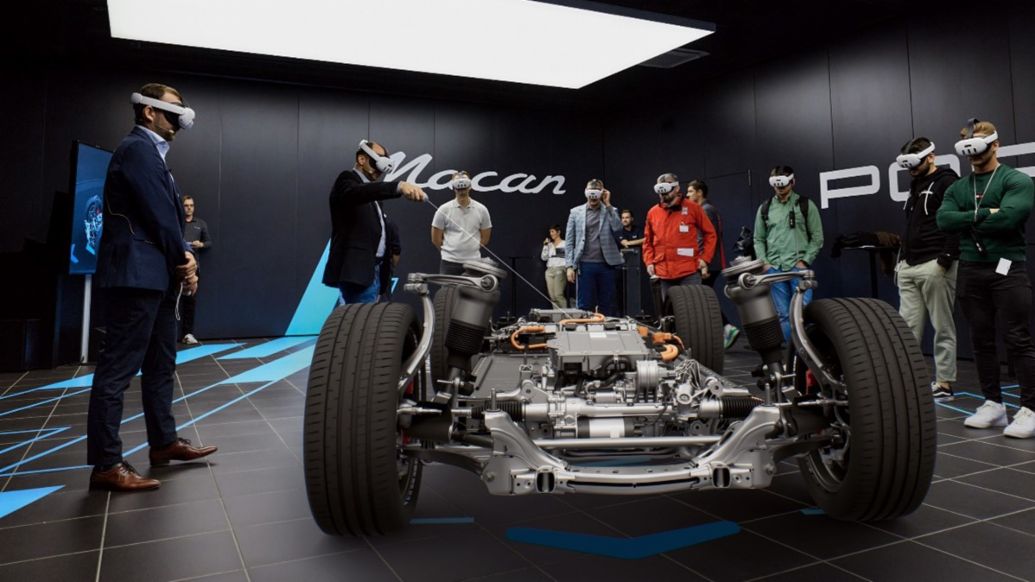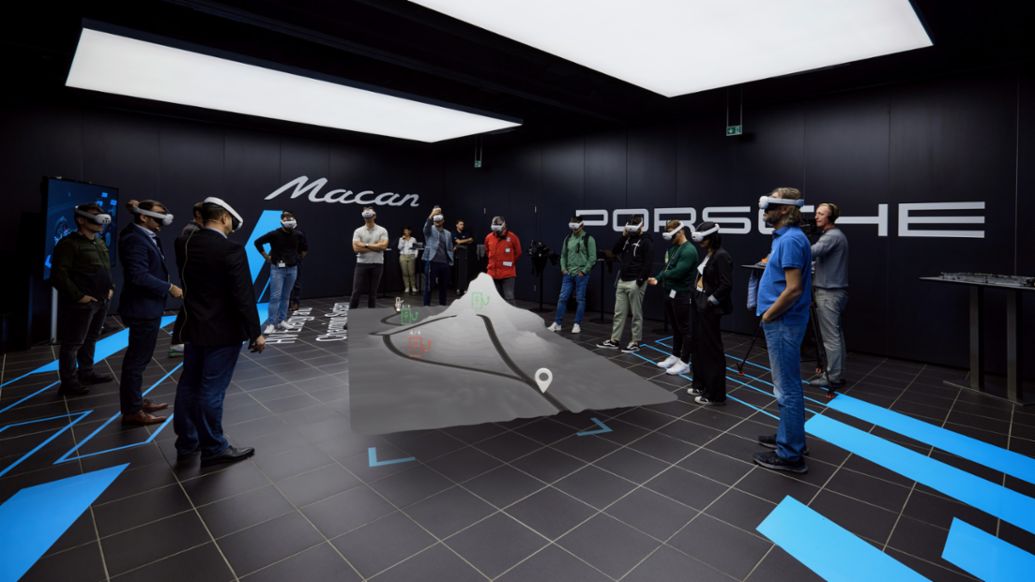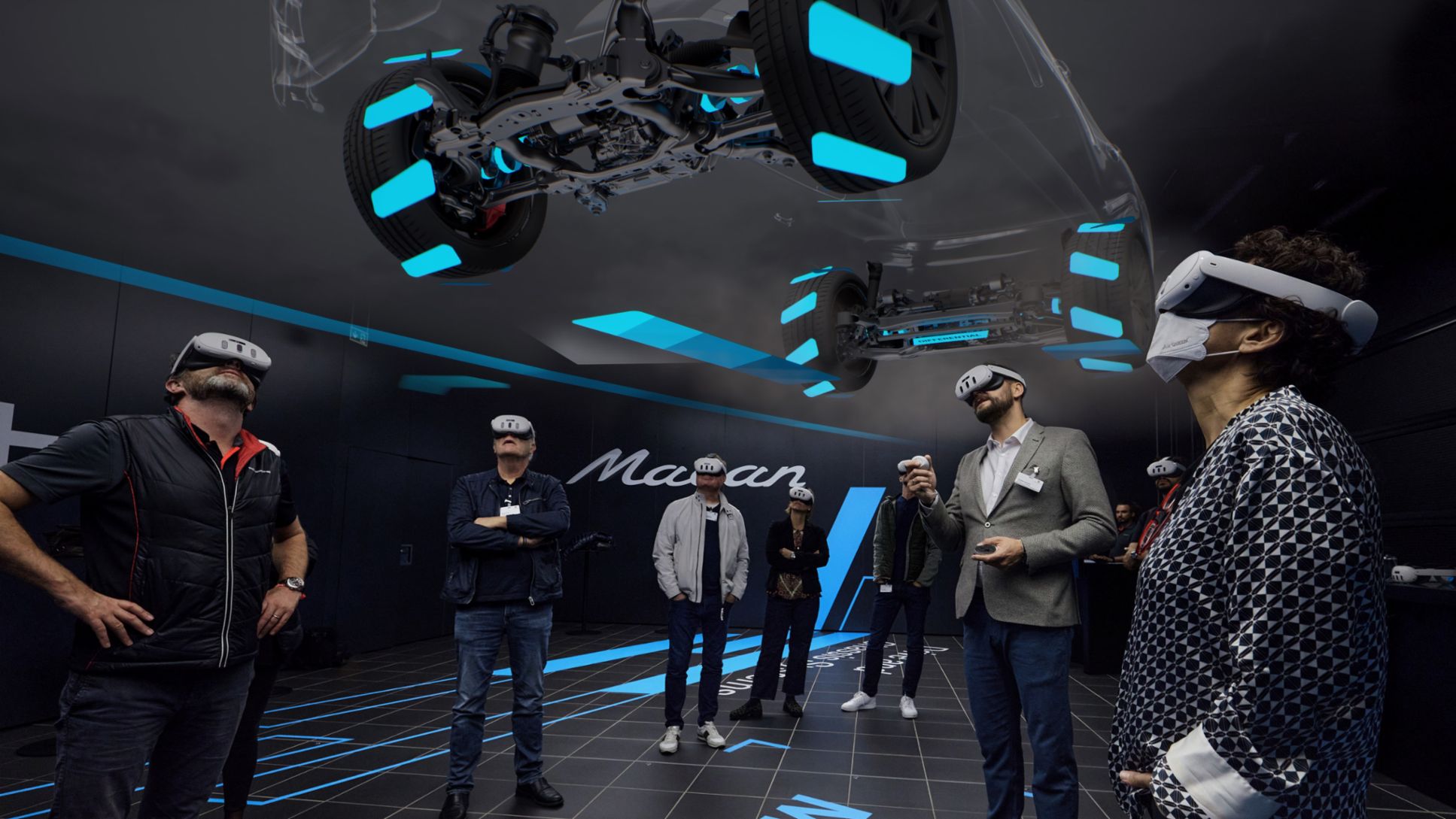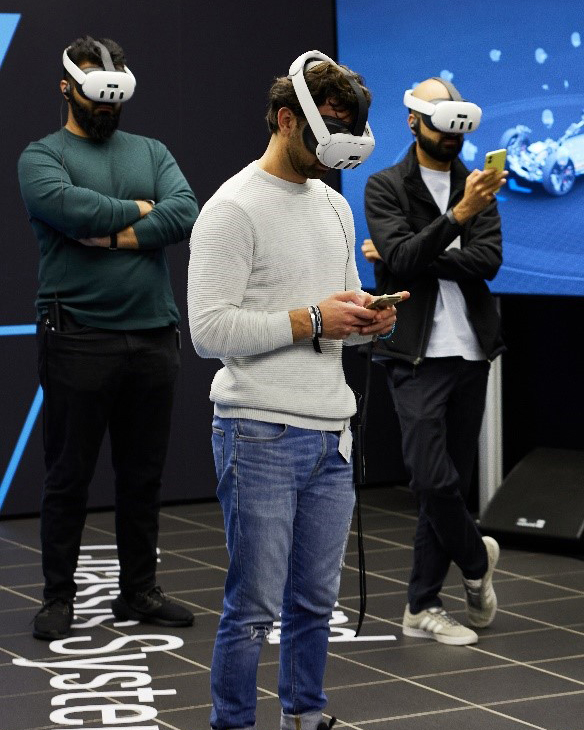Anyone walking into a recent Technology Workshop focused on the new all-electric Macan would have been forgiven for thinking that they had stumbled onto the set of a new sci-fi movie, or a futuristic performance art installation. Groups of engineers and media, wearing newly released Meta Quest 3 headsets, were moving around with unexpected grace, pointing into thin air, squatting, bending and peering – to all intents resembling a tai chi group conducting an improv class.
In the past, and even today in some instances, presentations at media events consisted of rows of journalists scribbling notes while engineers clicked through countless PowerPoint slides. The format is a status quo ripe for being challenged.
A few years ago, the Taycan AR Event App showed how augmented reality could delve beneath the skin of the Taycan to showcase the car’s in-depth engineering detail and unique technical features – using only an iPhone.
Now, Porsche is employing mixed-reality (MR) technology with the aim of creating an even more immersive and informative experience – with a three-dimensional environment in which it is possible to move around and interact with virtual objects and even other users joining remotely from all over the world.
When worlds collide: mixed reality
Mixed and virtual reality technology is a fundamental tool for the metaverse. The term metaverse refers to an immersive virtual realm spanning various digital platforms. And although a metaverse with true interoperability is some way off, Porsche is making great strides in demonstrating its potential. Using headsets with pass-through viewing capability, users are able to see their real surroundings – with sufficient resolution to write notes or use a phone – and virtual 3D assets. This makes for VR levels of immersion combined with the ability to orientate oneself in real physical space. Some people don’t like the idea of donning a VR headset in a room with others, so the ability to remain ‘grounded’ within the real world is a significant benefit of MR. While VR effectively transports the user to a virtual environment, this application of MR brings the virtual world to the user – within the context of their surroundings. What’s more, it all but removes the necessity of cut-away models or other physical assets to be manufactured and shipped around the world – highlighting significant potential to save costs and resources.
Traditional content, innovative delivery
Such physical props can be extremely valuable tools in explaining, for example, the technical features of a new model line. However, one of the superior advantages of 3D models in MR is their manoeuvrability within the viewing space. The ability to view the virtual models from different angles and perspectives yields a much deeper, and more quickly arrived at, level of understanding than simply viewing images on a screen. Content becomes significantly more meaningful to the viewer, whose attention can be easily directed to the areas being discussed. For example, by isolating certain parts or by switching to an exploded model view to see parts that were previously hidden. This offers the level of detail and insight of a deep-dive technical slideshow coupled with the perspective and visual impact of a physical exhibit.

“Already, presenting in this way feels like it has become second nature,” says one of the engineers and presenters at the recent workshop. “The storyline of the content works like a traditional presentation. You have your notes on a virtual billboard that only the host can see, and you click through life-sized, immersive 3D animations that are free from the confines of a screen – you’re standing within the presentation, surrounded by it.”
An invaluable resource
There were also positive reactions from journalists, who praised the sense of realism and the resolution quality of the virtual elements at the workshop. The expressions of surprise and delight stood out beneath many attendees’ headsets: smiles appearing in unison as the virtual elements were revealed and the technology’s potential became clear. “It was genuinely fascinating,” says British motoring journalist Alex Goy. “I think it’s an invaluable resource. There’s an almost tangibility to the presentation […] you can walk through it, you can reach out, and it’s all to scale as well, so you get a deeper impression of the product, of what goes into it, and what you could do with it – which you definitely wouldn’t get with a 2D show or a graphic on a screen.”
Looking to tomorrow
Despite being early adopters of this technology within the automotive sector, Porsche is not alone in understanding its potential. According to P&S Intelligence, by 2030, the metaverse is estimated to reach a global market value of $1.5 trillion, with $16.5 billion of that coming from the automotive industry alone. Younger market groups currently make up the vast majority of metaverse users; when surveyed, 56 per cent of Gen Z respondents said that they would more likely purchase a car if they had the opportunity to experience it virtually first. However, as the digital affinity of all age groups increases, so too will their perceived relevance of metaverse experiences.

Now that this application of MR technology has been proven, Porsche will continue to harness its potential to further enhance presentation experiences in a number of ways: hosting events with guests joining from separate locations (telepresence); increasing the sense of immersion with more complex models and animations; facilitating more physical interaction with virtual assets; and so much more. These prototype demonstrations have merely scratched the surface of the possibilities.


